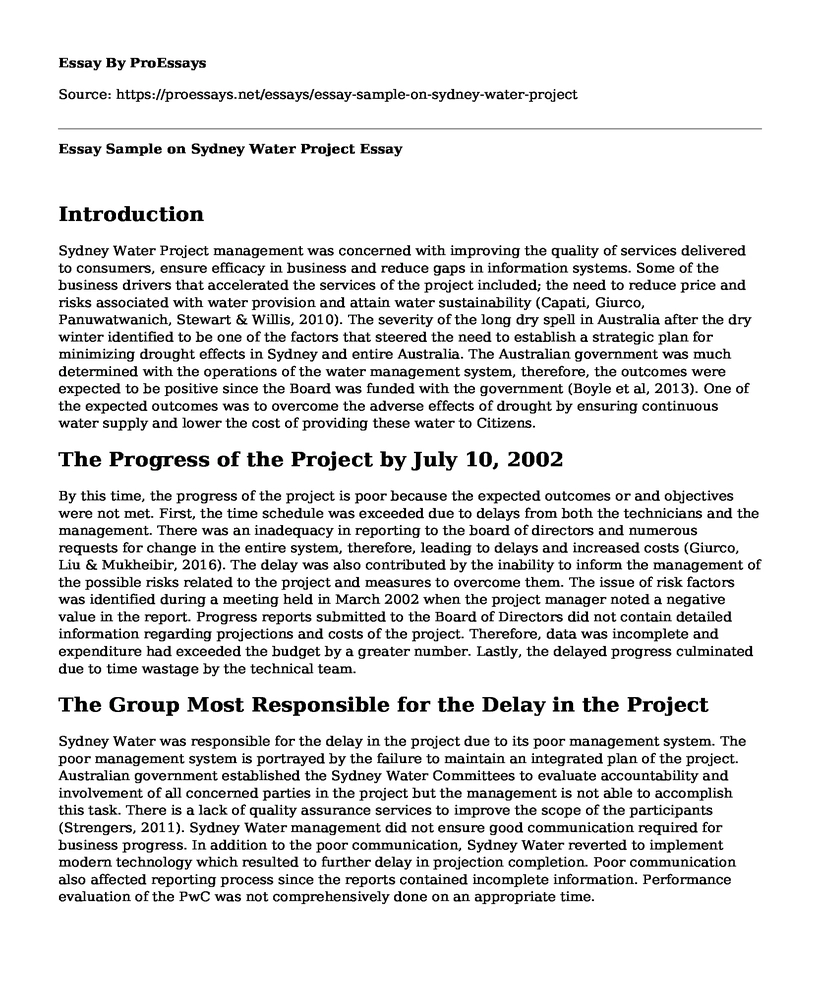Introduction
Sydney Water Project management was concerned with improving the quality of services delivered to consumers, ensure efficacy in business and reduce gaps in information systems. Some of the business drivers that accelerated the services of the project included; the need to reduce price and risks associated with water provision and attain water sustainability (Capati, Giurco, Panuwatwanich, Stewart & Willis, 2010). The severity of the long dry spell in Australia after the dry winter identified to be one of the factors that steered the need to establish a strategic plan for minimizing drought effects in Sydney and entire Australia. The Australian government was much determined with the operations of the water management system, therefore, the outcomes were expected to be positive since the Board was funded with the government (Boyle et al, 2013). One of the expected outcomes was to overcome the adverse effects of drought by ensuring continuous water supply and lower the cost of providing these water to Citizens.
The Progress of the Project by July 10, 2002
By this time, the progress of the project is poor because the expected outcomes or and objectives were not met. First, the time schedule was exceeded due to delays from both the technicians and the management. There was an inadequacy in reporting to the board of directors and numerous requests for change in the entire system, therefore, leading to delays and increased costs (Giurco, Liu & Mukheibir, 2016). The delay was also contributed by the inability to inform the management of the possible risks related to the project and measures to overcome them. The issue of risk factors was identified during a meeting held in March 2002 when the project manager noted a negative value in the report. Progress reports submitted to the Board of Directors did not contain detailed information regarding projections and costs of the project. Therefore, data was incomplete and expenditure had exceeded the budget by a greater number. Lastly, the delayed progress culminated due to time wastage by the technical team.
The Group Most Responsible for the Delay in the Project
Sydney Water was responsible for the delay in the project due to its poor management system. The poor management system is portrayed by the failure to maintain an integrated plan of the project. Australian government established the Sydney Water Committees to evaluate accountability and involvement of all concerned parties in the project but the management is not able to accomplish this task. There is a lack of quality assurance services to improve the scope of the participants (Strengers, 2011). Sydney Water management did not ensure good communication required for business progress. In addition to the poor communication, Sydney Water reverted to implement modern technology which resulted to further delay in projection completion. Poor communication also affected reporting process since the reports contained incomplete information. Performance evaluation of the PwC was not comprehensively done on an appropriate time.
The Request for an Extension
Extension of time should be granted for completion of the project. The need to add more time is basically because the process has already consumed a lot of money, therefore, terminating it would mean losing the funds that had been already used to start the project. For effective completion of the plan, recommendations and regulations should be put in place to guide the performance of all involved groups. To overcome the delays that may arise from the technical group, the potentiality of Information Technology should be evaluated and proven before assigning responsibilities to PwC. for value addition, experienced people should be hired to assist in the project completion. During the added time, Sydney Water should improve record management system for future reference.
References
Capati, G., Giurco, D., Panuwatwanich, K., Stewart, R. A., & Willis, R. (2010). Web-based knowledge management system: linking smart metering to the future of urban water planning. Australian Planner, 47(2), 66-74.
Boyle, T., Giurco, D., Liu, A., Mukheibir, P., Moy, C., Stewart, R., & White, S., (2013). Intelligent metering for urban water: a review. Water, 5(3), 1052-1081.
Giurco, D., Liu, A., & Mukheibir, P. (2016). Urban water conservation through customised water and end-use information. Journal of Cleaner Production, 112, 3164-3175.
Strengers, Y. (2011). Negotiating everyday life: The role of energy and water consumption feedback. Journal of Consumer Culture, 11(3), 319-338.
Cite this page
Essay Sample on Sydney Water Project . (2022, Nov 28). Retrieved from https://proessays.net/essays/essay-sample-on-sydney-water-project
If you are the original author of this essay and no longer wish to have it published on the ProEssays website, please click below to request its removal:
- Glencore Plc Organizational Operational Objectives - Essay Example
- Channel Optimization in Hospitality Secrets of Data-Driven Hoteliers Essay Example
- Strategies for Facilitating the Group Process - Essay Sample
- Essay Sample on 3 Types of Ethical Decision-Making for Leaders
- Essay Example on Samaritan's Purse: Effective Leadership Skill for Organization Administration
- Essay Sample on Leadership Skills for Volatile, Uncertain, Complex and Ambiguous Organizations
- Paper Example on Annual Report: Financial Performance & Strategic Plans







